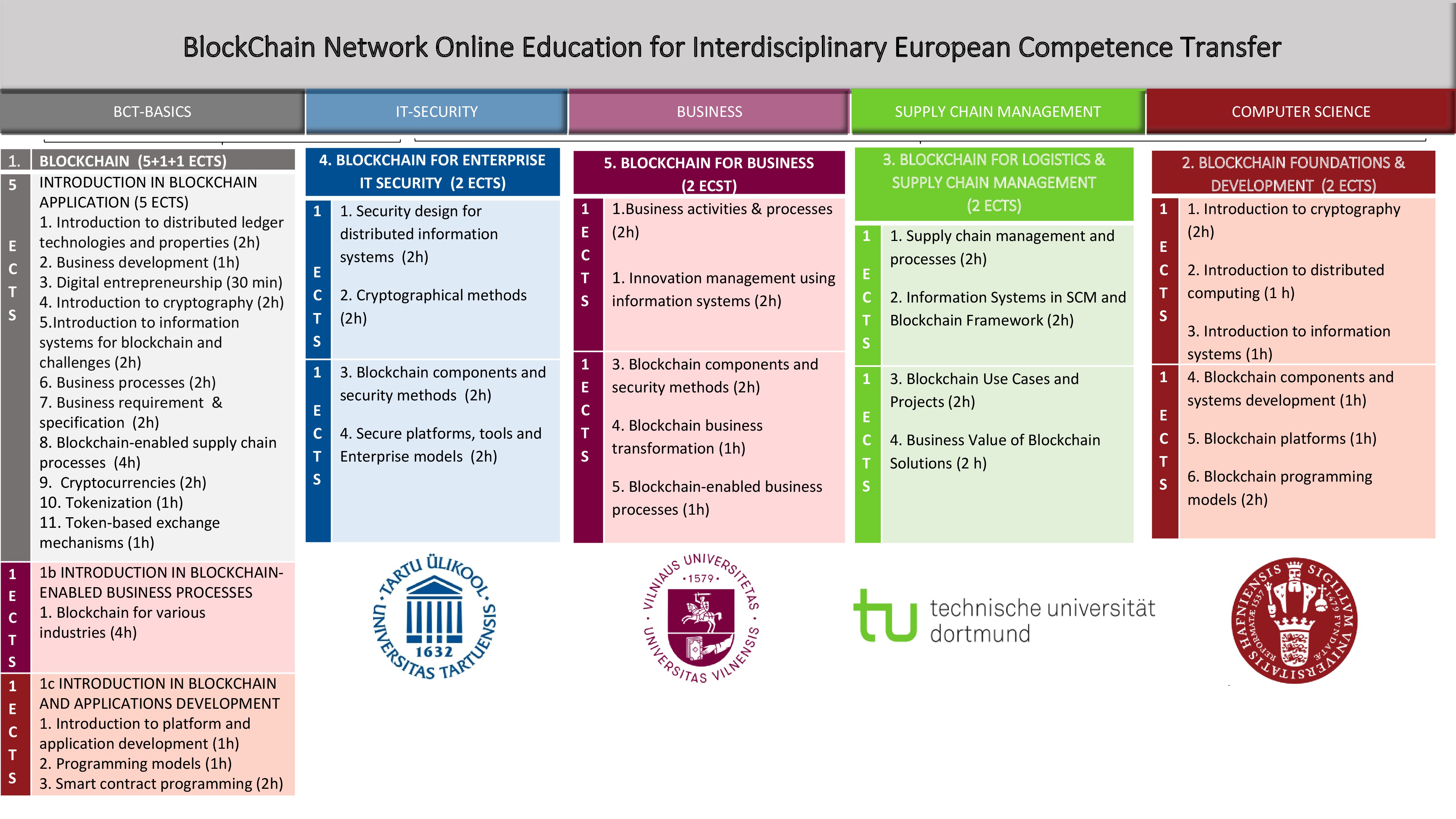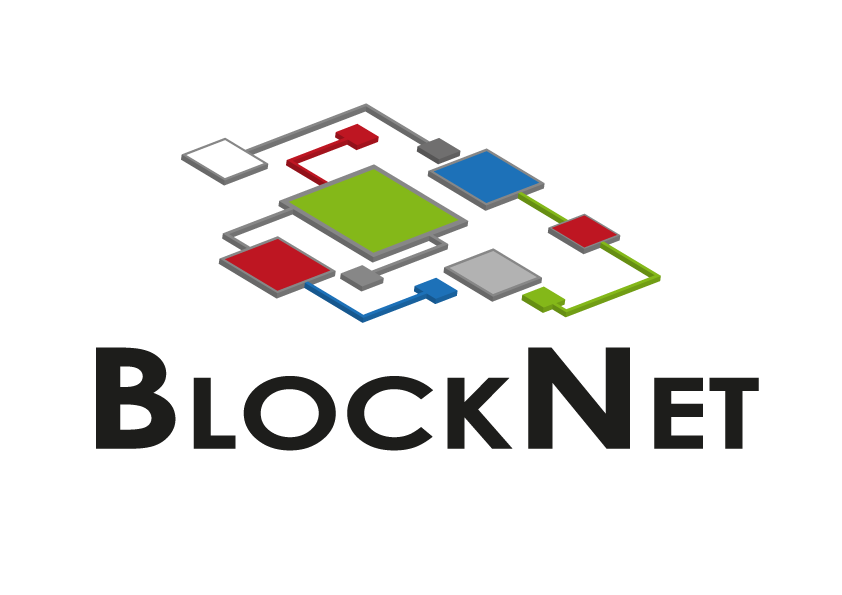
This course is offered as part of the BlockNet (“BlockChain Network Online Education for interdisciplinary European Competence Transfer”) Project funded by the European Commission in the context of the Erasmus+ program “KA2-Cooperation for Innovation and the Exchange of Good Practices. Strategic Partnerships for higher education” (grant no. 2018-1-LT01-KA203-047044).
- Įregistruoti besimokantieji: Šiame kurse nėra besimokančiųjų.
Blockchain has the potential to disrupt multiple industries by making transactions and processes more democratic, secure, transparent, and efficient. Building on this vision, You will explore how the capabilities and the underlying mechanism of blockchain can be applied to generate economic and social value. This course highlights the central topics of blockchain and distributed ledger technologies. It is designed to familiarize you with the foundations of blockchain technology and its key application areas. Practical case studies are presented by external industry stakeholders.
Intended learning outcomes:
By the end of the course, You should be able to:
1. Identify and explain the foundations, architecture, concepts, principles, and technologies that were presented in the course, including their key terminology, underlying assumptions, and how they relate to one another.
2. Compare the principal characteristics of blockchain platforms.
3. Demonstrate how the theories, concepts, and Blockchain technologies that were presented in the course were applied in the different topics of IT security, Business, Supply Chain Management, and Computer Science.
Student workload:
|
Task |
Total hours |
|
Lectures |
17.5 |
|
Audio and video materials |
7.5 |
|
Case studies |
20 |
|
Further Readings |
90 |
|
Total |
135 |
This course is offered as part of the BlockNet (“BlockChain Network Online Education for Interdisciplinary European Competence Transfer”) Project funded by the European Commission in the context of the Erasmus + program “KA2-Cooperation for Innovation and the Exchange of Good Practices. Strategic Partnerships for higher education ”(grant no. 2018-1-LT01-KA203-047044).
- Įregistruoti besimokantieji: 244
Why are many businesses planning to adopt blockchain technologies, and why do so many people claim it will revolutionize the world? Blockchain technology is arguably one of the most promising and most hyped innovations of recent years. Blockchain technology is beginning to challenge practices in various business sectors. So, in this course You will explore the opportunities for blockchain technology in various industries.
By the end of the course, You should be able to:
1. Identify opportunities, needs and challenges for blockchain technologies in various industries:
2. Recognize regulatory uncertainty challenge for the adoption of blockchain technologies.
|
Task |
Total hours |
|
Lectures |
4 |
|
Audio and video materials |
1 |
|
Case studies |
7 |
|
Further Readings |
16 |
|
Total |
28 |
This course is offered as part of the BlockNet (“BlockChain Network Online Education for interdisciplinary European Competence Transfer”) Project funded by the European Commission in the context of the Erasmus+ program “KA2-Cooperation for Innovation and the Exchange of Good Practices. Strategic Partnerships for higher education” (grant no. 2018-1-LT01-KA203-047044).
- Įregistruoti besimokantieji: 201
Blockchain is considered to be one of the most promising technologies, so it has aroused the enthusiasm for learning it all over the world. However, since blockchain spans multiple disciplines such as computer science, cryptography, and economics, beginners who want to learn and apply blockchain technology are often at a loss. In this course, we will introduce the basic knowledge of blockchain and simple smart contract development to help novices quickly get started with blockchain.
Intended learning outcomes:
By the end of the course, you should be able to:
1. Grasp the basic concepts of blockchain and be familiar with representative blockchain platforms, including public and private chains.
2. Understand the basic model and application development process of blockchain.
3. Understand blockchain data structure, transaction structure, and typical consensus algorithms.
4. Explain what a smart contract is and what it differs from a legal contract.
5. Learn Ethereum blockchain platform and how it works.
6. Learn how to apply the basic modelling standards to a blockchain-oriented software.
Student workload:
|
Task |
Total hours |
|
Class lectures and exercises |
4 |
|
Audio and video materials |
4 |
|
Case studies |
9.5 |
|
Further Readings |
10.5 |
|
Total |
28 |
This course is offered as part of the BlockNet (“BlockChain Network Online Education for interdisciplinary European Competence Transfer”) Project funded by the European Commission in the context of the Erasmus+ program “KA2-Cooperation for Innovation and the Exchange of Good Practices. Strategic Partnerships for higher education” (grant no. 2018-1-LT01-KA203-047044).
- Įregistruoti besimokantieji: 176
Blockchain is widely known as a distributed ledger technology with many salient characteristics such as decentralization, tamper-resistance, and traceability. These advantages have fostered a large number of blockchain platforms and decentralized applications (DAPP) beyond cryptocurrencies. Why does blockchain have such attracting features and application promise? What are the underlying supporting techniques? What are the overall architecture and basic components of blockchain? How does it work and what are the trending blockchain platforms? How can we develop a DAPP for practical need? In this course, we will explore blockchain foundations, including the major cryptographic techniques, distributed systems, information systems, and its basic components. We then present several representative blockchain platforms and compare them from a multi-dimensional perspective. Finally, we introduce the blockchain programming models with a specific focus on smart contract design on the Ethereum blockchain. Several application examples are provided for ease of understanding.
Intended learning outcomes:
By the end of the course, you should be able to:
1. Understand and explain the cryptographic technique used in blockchain, CAP theorem and the trade-off among properties in distributed system, blockchain data structure, consensus algorithms, and basic work principle.
2. Identify public, private, and consortium blockchain platforms, their differences in governance, access, security, cost…, learn how to choose a blockchain platform for your application development.
3. Apply the basic modelling standards to develop smart contracts on the Ethereum blockchain according to the application needs.
Student workload:
|
Task |
Total hours |
|
Class lectures and exercises |
8 |
|
Audio and video materials |
6.5 |
|
Case studies |
10 |
|
Further Readings |
30 |
|
Total |
54.5 |
This course is offered as part of the BlockNet (“BlockChain Network Online Education for interdisciplinary European Competence Transfer”) Project funded by the European Commission in the context of the Erasmus+ program “KA2-Cooperation for Innovation and the Exchange of Good Practices. Strategic Partnerships for higher education” (grant no. 2018-1-LT01-KA203-047044).
- Įregistruoti besimokantieji: 103
Building up on the supply chain introductory module “Introduction to Blockchain-Enabled Supply Chain Processes”, where first definitions and basics are conveyed, the advanced section “Blockchain for Logistics and Supply Chain Management is composed of another four modules.
Intended learning outcomes:
By the end of the course, You should be able to:
1. Understand the main tasks and goals of SCM
2. Understand the implications of globalization, digitalization and other trends that affect SCM and identify relevant pain points
3. Understand the implications of blockchain technology in and for SCM and have knowledge about different use cases and why they are initiated
4. Explain supply chain processes and corresponding challenges
5. Explain different types of blockchains and understand which ones can be utilized for SCM
6. Understand the key components and involved parties of blockchain projects and how they are set up
7. Explain different disciplines and enterprise functions involved in blockchain projects
8. Understand the opportunities and challenges blockchain projects are facing
9. Be able to identify and explain steps needed for a blockchain integration in business processes
Student workload:
|
Task |
Total hours |
|
Class lectures and exercises |
8 |
|
Preparation of classes |
12 |
|
Follow-up on classes |
12 |
|
Exam preparation |
20 |
|
Total |
52 |
This course is offered as part of the BlockNet (“BlockChain Network Online Education for interdisciplinary European Competence Transfer”) Project funded by the European Commission in the context of the Erasmus+ program “KA2-Cooperation for Innovation and the Exchange of Good Practices. Strategic Partnerships for higher education” (grant no. 2018-1-LT01-KA203-047044).
- Įregistruoti besimokantieji: 65
Intended learning outcomes:
By the end of
the course, You should be able to: 1. Identify
and explain the foundational theories, concepts, and technologies used in the
cryptographic methods in Blockchains. This includes to: - Recognize
security countermeasure implications - Explain
how the use of the Blockchain technology can secure data, information and
processes - Underline
significant encryption and signature schemes - Describe
transaction protection and validation principles - Explain
identity management principles using the Blockchain solutions - Explain
access control models - Describe
privacy management principles using the Blockchain solutions 2. Exhibit
the ability to apply blockchain technology through assessable model fragments. 3. Reflect
on systems design and foundational or security challenges. Student
workload: Task Total hours Class
lectures and exercises 8 Audio and
video material 8 Case studies 15 Further
reading 14 Preparation
for exam 7 Total 52
This course is offered as part of the BlockNet (“BlockChain Network Online Education for interdisciplinary European Competence Transfer”) Project funded by the European Commission in the context of the Erasmus+ program “KA2-Cooperation for Innovation and the Exchange of Good Practices. Strategic Partnerships for higher education” (grant no. 2018-1-LT01-KA203-047044).
- Įregistruoti besimokantieji: 76
Blockchain technology has gained widespread traction and is attracting investments like no other emerging technology. A growing number of use cases are being discussed, tested, and implemented across a range of industries. In this course You will explore blockchain potential form business management perspective.
Intended learning outcomes:
By the end of the course, You should be able to:
1. Identify and explain the foundational theories, concepts, and technologies that were presented in the course, including their key terminology, underlying assumptions, and how they relate to one another.
2. Identify the opportunities for blockchain application in supporting the goals of business process optimization.
3. Explain the role of blockchain in enabling business development and innovation.
4. Discuss what specific opportunities for business transformation can be enabled by blockchain.
Student workload:
|
Task |
Total hours |
|
Lectures |
8 |
|
Audio and video materials |
4 |
|
Case studies |
6 |
|
Further Readings |
36 |
|
Total |
54 |
This course is offered as part of the BlockNet (“BlockChain Network Online Education for interdisciplinary European Competence Transfer”) Project funded by the European Commission in the context of the Erasmus+ program “KA2-Cooperation for Innovation and the Exchange of Good Practices. Strategic Partnerships for higher education” (grant no. 2018-1-LT01-KA203-047044).
- Įregistruoti besimokantieji: 129









